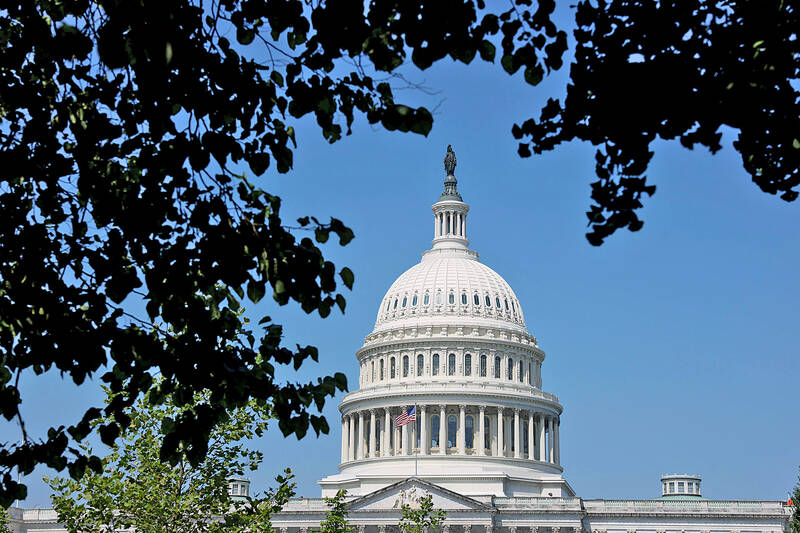The US House of Representatives on Monday advanced a bill that supports Taiwan’s return to the IMF due to its stature in the global economy.
The House unanimously passed the Taiwan Non-Discrimination Act, which stipulates that the US secretary of the treasury, who serves as the US governor to the IMF, should “vigorously support the admission of Taiwan as a member” in the institution.
The IMF, which has 191 members, promotes global financial stability and economic growth by providing financial assistance, policy advice and economic surveillance to members.

Photo: AFP
The Republic of China was a founding member of the IMF before its place was taken by the People’s Republic of China in 1980, nine years after Taipei lost its UN seat.
Before the bill was to put to a vote, one of its initiators, US Representative Young Kim, spoke in support of Taiwan.
“Taiwan — the 21st-largest economy in the world and producer of 90 percent of the world’s advanced semiconductor chip supply — doesn’t just deserve a seat at the table at the IMF. The free world needs Taiwan at the IMF,” Kim said.
“We cannot be complicit as international organizations cede leverage to Beijing and silence Taiwan’s voice,” she said. “I thank my colleagues for joining me to support Taiwan’s participation in the IMF, and I will keep fighting to get this to [US] President [Donald] Trump’s desk.”
US Representative Al Green, another initiator of the bill, said that supporting Taiwan to join the IMF is “a commonsense, bipartisan measure that furthers the long-term interests of both Taiwan and the US.”
“Taiwan’s expertise developing one of the largest and most complex economies in the world would bring a valuable perspective to multilateral economic organizations,” Green said.
The bill still needs the approval of the US Senate before the president can sign it into law or veto it.
A similar piece of legislation passed the House in the previous Congress, but failed to pass the Senate.
In Taipei, Ministry of Foreign Affairs spokesman Hsiao Kuang-wei (蕭光偉) thanked the House for unanimously passing the bill.
The move fully demonstrates the US’ bipartisan and firm support for Taiwan’s participation in international organizations and greater international space, and further highlights Taiwan’s economic resilience and importance as a global partner, Hsiao said.
“The advancement of the act has positive significance on supporting Taiwan’s greater global participation and in countering China’s pressure on Taiwan,” he said.
Additional reporting by Lee I-chia

PREPAREDNESS: Given the difficulty of importing ammunition during wartime, the Ministry of National Defense said it would prioritize ‘coproduction’ partnerships A newly formed unit of the Marine Corps tasked with land-based security operations has recently replaced its aging, domestically produced rifles with more advanced, US-made M4A1 rifles, a source said yesterday. The unnamed source familiar with the matter said the First Security Battalion of the Marine Corps’ Air Defense and Base Guard Group has replaced its older T65K2 rifles, which have been in service since the late 1980s, with the newly received M4A1s. The source did not say exactly when the upgrade took place or how many M4A1s were issued to the battalion. The confirmation came after Chinese-language media reported

The Taiwanese passport ranked 33rd in a global listing of passports by convenience this month, rising three places from last month’s ranking, but matching its position in January last year. The Henley Passport Index, an international ranking of passports by the number of designations its holder can travel to without a visa, showed that the Taiwan passport enables holders to travel to 139 countries and territories without a visa. Singapore’s passport was ranked the most powerful with visa-free access to 192 destinations out of 227, according to the index published on Tuesday by UK-based migration investment consultancy firm Henley and Partners. Japan’s and

A Ministry of Foreign Affairs official yesterday said that a delegation that visited China for an APEC meeting did not receive any kind of treatment that downgraded Taiwan’s sovereignty. Department of International Organizations Director-General Jonathan Sun (孫儉元) said that he and a group of ministry officials visited Shenzhen, China, to attend the APEC Informal Senior Officials’ Meeting last month. The trip went “smoothly and safely” for all Taiwanese delegates, as the Chinese side arranged the trip in accordance with long-standing practices, Sun said at the ministry’s weekly briefing. The Taiwanese group did not encounter any political suppression, he said. Sun made the remarks when

BROAD AGREEMENT: The two are nearing a trade deal to reduce Taiwan’s tariff to 15% and a commitment for TSMC to build five more fabs, a ‘New York Times’ report said Taiwan and the US have reached a broad consensus on a trade deal, the Executive Yuan’s Office of Trade Negotiations said yesterday, after a report said that Washington is set to reduce Taiwan’s tariff rate to 15 percent. The New York Times on Monday reported that the two nations are nearing a trade deal to reduce Taiwan’s tariff rate to 15 percent and commit Taiwan Semiconductor Manufacturing Co (TSMC, 台積電) to building at least five more facilities in the US. “The agreement, which has been under negotiation for months, is being legally scrubbed and could be announced this month,” the paper said,